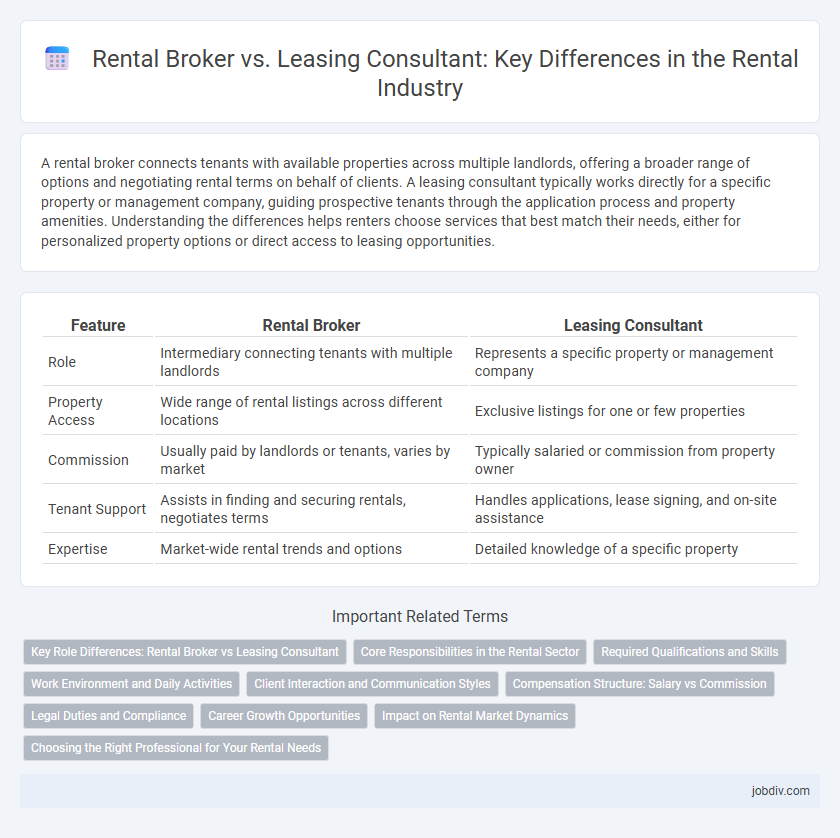A rental broker connects tenants with available properties across multiple landlords, offering a broader range of options and negotiating rental terms on behalf of clients. A leasing consultant typically works directly for a specific property or management company, guiding prospective tenants through the application process and property amenities. Understanding the differences helps renters choose services that best match their needs, either for personalized property options or direct access to leasing opportunities.
Table of Comparison
| Feature | Rental Broker | Leasing Consultant |
|---|---|---|
| Role | Intermediary connecting tenants with multiple landlords | Represents a specific property or management company |
| Property Access | Wide range of rental listings across different locations | Exclusive listings for one or few properties |
| Commission | Usually paid by landlords or tenants, varies by market | Typically salaried or commission from property owner |
| Tenant Support | Assists in finding and securing rentals, negotiates terms | Handles applications, lease signing, and on-site assistance |
| Expertise | Market-wide rental trends and options | Detailed knowledge of a specific property |
Key Role Differences: Rental Broker vs Leasing Consultant
Rental brokers primarily act as intermediaries connecting potential tenants with available rental properties across multiple landlords, facilitating market access and negotiation processes. Leasing consultants are typically employed by property management companies and focus on managing specific property portfolios, handling tenant inquiries, lease agreements, and property tours. The key role difference lies in scope: rental brokers offer broader market exposure, while leasing consultants provide in-depth knowledge and direct management of individual property complexes.
Core Responsibilities in the Rental Sector
Rental brokers primarily connect tenants with available properties by marketing listings and facilitating communication between landlords and renters. Leasing consultants manage property showings, handle lease applications, and ensure compliance with leasing policies while providing tenant support throughout the rental process. Both roles focus on maximizing occupancy rates and maintaining positive landlord-tenant relationships but differ in their direct involvement with lease administration and client interaction.
Required Qualifications and Skills
Rental brokers require strong sales skills, negotiation abilities, and in many regions, a valid real estate license is mandatory to operate legally. Leasing consultants need excellent customer service skills, thorough knowledge of rental property management, and familiarity with lease agreements and fair housing laws. Both roles demand strong communication skills, attention to detail, and the ability to manage client relationships effectively.
Work Environment and Daily Activities
Rental brokers typically operate in dynamic office settings or remote environments, frequently interacting with multiple clients and property owners to negotiate lease terms and close rental deals. Leasing consultants often work on-site at apartment complexes or property management offices, focusing on showing units, processing applications, and maintaining resident relations on a daily basis. The work environment for rental brokers leans more towards independent sales and client acquisition, while leasing consultants engage directly with tenants to ensure smooth occupancy and satisfaction.
Client Interaction and Communication Styles
Rental brokers prioritize broad client engagement through diverse platforms, facilitating swift property matches using expansive market knowledge and proactive outreach. Leasing consultants emphasize personalized interactions, delivering detailed property insights and building rapport through consistent communication, often onsite or via scheduled meetings. Both roles adapt communication styles to client needs but differ in approach; brokers lean towards efficiency and volume, while leasing consultants focus on depth and relationship building.
Compensation Structure: Salary vs Commission
Rental brokers typically earn commissions based on a percentage of the lease value, incentivizing them to close more deals and maximize rental income. Leasing consultants often receive a fixed salary complemented by bonuses tied to performance metrics such as occupancy rates and tenant retention. This compensation structure influences their approach, with brokers motivated by immediate sales volume while leasing consultants focus on long-term property management success.
Legal Duties and Compliance
Rental brokers and leasing consultants both facilitate property rentals, but rental brokers operate under stricter licensure and regulatory compliance, often required to hold a real estate license depending on jurisdiction. Leasing consultants primarily focus on tenant placement and lease administration, while rental brokers must ensure all transactions comply with state and federal laws, including fair housing and disclosure requirements. Both roles demand attention to legal duties, but brokers bear greater responsibility for adherence to real estate statutes and ethical standards.
Career Growth Opportunities
Rental brokers often experience faster career growth by handling multiple property types and expanding their client base, which enhances their marketability and income potential. Leasing consultants typically develop specialized knowledge within specific property portfolios, allowing for advancement into property management or real estate sales roles. The choice between these careers depends on the desired path in real estate, with brokers benefiting from broader opportunities and consultants gaining depth in leasing operations.
Impact on Rental Market Dynamics
Rental brokers facilitate a broader range of tenant-landlord interactions by connecting multiple property listings with potential renters, increasing market transparency and enhancing competitive pricing. Leasing consultants, employed directly by property management, focus on individual property portfolios, ensuring efficient occupancy rates and tailored tenant services, which stabilize rental supply. Together, their roles dynamically influence rental market liquidity, pricing trends, and tenant satisfaction levels.
Choosing the Right Professional for Your Rental Needs
Rental brokers specialize in connecting tenants with available properties across multiple listings, offering a broad market perspective and negotiation expertise to secure favorable lease terms. Leasing consultants work directly for property owners or management companies, providing in-depth knowledge of specific buildings, policies, and leasing procedures. Choosing the right professional depends on whether you need extensive property options and market insights from a rental broker or personalized service and detailed property guidance from a leasing consultant.
Rental Broker vs Leasing Consultant Infographic

 jobdiv.com
jobdiv.com